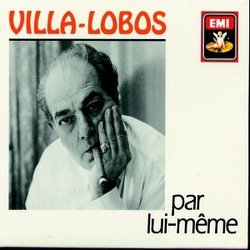| All Artists: Maurice Cliquennois, Aline Van Barentzen, Henri Branschwak, Magda Tagliaferro, Felicia Blumental Title: Villa-Lobos par lui-m�me Members Wishing: 0 Total Copies: 0 Label: EMI Classics Release Date: 4/5/1991 Album Type: Box set Genres: Special Interest, Classical Styles: Opera & Classical Vocal, Chamber Music, Forms & Genres, Concertos, Suites, Historical Periods, Early Music, Modern, 20th, & 21st Century, Instruments, Keyboard, Symphonies Number of Discs: 6 SwapaCD Credits: 6 UPC: 077776722924 |
Search - Maurice Cliquennois, Aline Van Barentzen, Henri Branschwak :: Villa-Lobos par lui-m�me
 | Maurice Cliquennois, Aline Van Barentzen, Henri Branschwak Villa-Lobos par lui-m�me Genres: Special Interest, Classical
|
Larger Image |
CD Details |
CD ReviewsFor Villalobos Fans Only the_drone | 04/30/2000 (3 out of 5 stars) "There is one reason and one reason only to buy this box set of historical recordings made by Villalobos himself in the 1950s: a fanatic admiration for the works of this composer. But you should know that if you love this music, you should be prepared to buy other, more recent, recordings of these works. These are mono recordings, and the sound textures you expect from this composer are therefore muddled and flattened (the beautiful Choros No. 2 is the biggest victim here, which sounds so flat that you will miss the playful contrasts between the flute and the clarinet). You should also know that Villalobos is not a great conductor, but the lack of precision in the playing is often compensated by the emotional weigth he gives to his performances (he appears to have been a crowd pleaser). There are many pleasures, however, and I listen to disc number 3, which includes the Bachianas Brasileiras 4-7 so often that it has become a soundtrack to my life. Bachianas 4 and 7 deserve more listeners. The famous Bachiana Brasileira No. 5 included in this set, is sung by Victoria de los Angeles beautifully, but this performance is also available in a single CD anthology. I am giving this set three stars: one for the historic importance of these EMI records, one for the affordability and completeness of the box set itself (it is a bargain at $6 per CD), and one for the emotional significance of hearing these performances conducted by Villalobos (I am a Latin American and this music fills me with both pleasure and pride)." It was okay in the early days when V-L was unrecorded Wildfire | UK | 09/25/2003 (3 out of 5 stars) "This set comprises a huge array of Villa-Lobos' works conducted by himself and, sorry to say, none too well. He seems to lack the sensitivity other interpreters can bring to his work - he's far from alone in this situation - many composers have fallen into the same trap. The textures are thick, the sound cluttered (mono it might be but surely the engineers could have done better?) and the music simply lacks the excitement of which it is capable to no small degree. In part, the orcehstra is barely capable of performing such music. Stravinsky was one thing - Villa-Lobos' internal rhythmic complexity and stubbornly awkward manuscript writing is something aside. He did not always notate in the simplest way. Probably the best item in the set is the "Discovery of Brazil Suite". At least it received an audience and was not re-recorded until very recently. Some of the Bachianas have been handled better by others but at least this recording was a first complete set. Only the No. 5 was otherwise known. I have to confess that if I'd encountered Villa-Lobos through these performances I doubt I'd have followed through. Thankfully I came in via the accomplished and brilliant performance of his Quintette en forme de Choros by the New York Wind Quintet. Later, I encountered the LPs of the "Discovery of Brazil Suite", credible but flat, compared with other recordings appearing around the same time. Compare, for instance, his own 1958 recording of Forest of the Amazon in which he shows how well he can conduct if he tries, not to forget the superb hi-fi stereo recording that really let light and air into the performance. Nonetheless, I bought this set on the strength of price and to have the "Discovery" Suite on CD, along with a couple of his Bachianas. I would not recommend these discs as an introduction to the composer. Do not be tempted by its modest price!" Historic N. Hopkins | Stockton, CA USA | 01/31/2004 (4 out of 5 stars) "Opposite Rio de Janeiro's small Villa Lobos museum -- in what was his last home -- is a modern apartment building. Its name is Edificio Sebastiao Bach. VL would have loved it: he adored Bach above all other composers. Hence the 'Bachianas Brasilieras' (which, however, owe little to Bach beyond their joy in sound and intricacy in structure).What previous reviewers have said is true. The sound on these disks is abominable. A much better job could be done -- and should have been done -- of remastering the originals. That won't happen unless there's a sudden renewal of interest in the music of this Brazilian master.Further, the the performances -- and the composer's conducting -- are generally lackluster. Still, any VL lover should not be without this set. Toscanini no doubt did a better job with Brahms's symphonies. But who wouldn't give his soul for a recording of Brahms himself conducting the four of them?One special recommendation: the 'Choros' stand close to the summit of VL's art, more so than the BBs. A dance not a choral form, the 'choro' is both universally appealing and quintessentially Brazilian."
|

 Track Listings (10) - Disc #1
Track Listings (10) - Disc #1